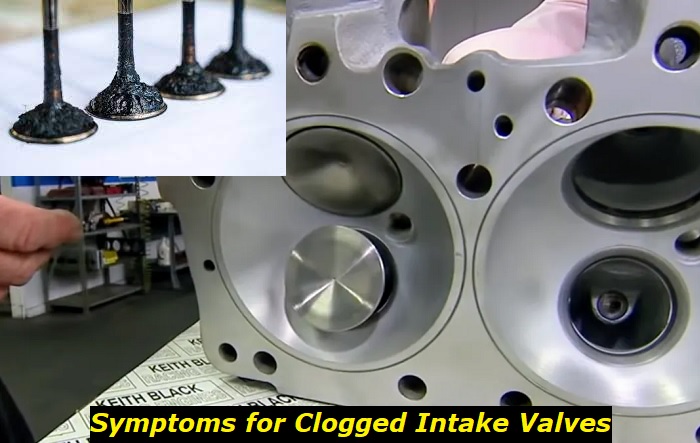The intake valves may be dirty because of the direct injection system, bad gasoline, and dirty air, and you can fix this by cleaning the valves. Professional help is needed to clean the valves because this procedure is complicated and requires taking apart the entire engine head.
Camshaft problems highlights
- Level of importance:Medium
- Commonreasons:Variable valve timing actuator problems, cam bearings issues, overheating
- DIY inspection:Possible but complicated
- DIY repair:Impossible
- Price for repair:$350 - $850
- Can you drive?Usually, yes
- Ways to fix:Clean the VVT (VCT) solenoids, inspect the camshaft, clean the valves

Common symptoms of clogged and dirty intake valves
The valves in your engine are working in the hottest part of the machine. They deal with burning gasoline, and have to cope with hundreds of explosions every single minute when the engine is working. This inevitably leads to contamination of the valves.
But we don't see these parts of our engines and that's why we can't say for sure that the valves are clogged or contaminated until we actually see them. But to do this, you will need to take the head off the engine which requires a lot of work.
So, here are some symptoms that can relate to clogged intake valves:
- Bad starting. Very often, contaminated valves work really poorly when the engine is cold, so bad starting is one of the major issues.
- Cold stalling. When the engine is idling after you start it, the vehicle with clogged valves may easily stall.
- Hesitation when accelerating. You will most likely feel the effect as if someone is holding the back part of the car and doesn't allow it to accelerate.
- Engine sputtering. This is especially noticeable when you accelerate - the engine may just suddenly lose power and then get it back quickly.
- Poor gas mileage. The gas consumption may grow up to 30% which is hard to overlook.
- Rough idle. Also, you will notice that the engine is running rough and the needle of the odometer is dancing rather than standing firmly on its idle RPM.
Unfortunately, all these symptoms may also be present when the engine has other problems such as fuel injection issues, fuel pressure problems, ignition malfunction, etc. So, you can't say for sure that the intake valves are in charge of what is happening with your vehicle. But at least, you can include valves in the list of possible problems.
If you keep reading, you will have several other factors that will help you decide whether intake valves are worth checking further.
What engines suffer from intake valves contamination?
All gas and diesel engines can have these problems, but there is a certain group that has the intake valves carbon buildup as its common issue. This is the group of gasoline direct injection engines.
Direct injection means that the fuel is injected directly into the chamber, not in the intake manifold. It means that the fuel doesn't come through the valves. Only air comes through intake valves. This leads to problems because, in simple port injection systems, fuel literally washes intake valves.
A couple of years ago, car manufacturers started making engines with combined injection systems - they have direct injection and also port injection and this helps the vehicle avoid carbon buildup on intake valves.
So, now you know that if you have a direct injection engine and it experiences those symptoms described above, chances are that the intake valves are clogged and require cleaning.
How fast do intake valves get clogged?
It depends on the type of engine, quality of filters, area of driving, etc. But on average, a direct injection engine will have clogged valves at about 50,000 miles. That's why I usually recommend having the valves cleaned every 30-35 thousand miles to avoid these issues.
In port injection engines and also in machines with combined types of injection, you will most likely have the valves clogged much later than that. Some engines may go their entire life without valve cleaning. Of course, valves still get dirty but it doesn't affect the work of these engines as badly as the carbon buildup affects direct injection engines.
What's the carbon buildup on intake valves?
To make it easy to understand, let's say that carbon buildup is the product of fuel combustion in the chamber. Not 100% of fuel burns in the chamber and some products burn after the main explosion. These products leave certain soot on the valves and on other parts of the engine.
If the valves are cleaned by the fuel that is injected through them, they will most likely be OK. But in direct injection engine. Only air comes through these valves. It means that the intake valves will get covered in this soot and it will quickly develop a huge problem. After some time, the valves won't be able to close properly because of the soot in their working parts.
Also, the soot hardens and makes it impossible to clean the valves without removing the engine head.
Now you know what's happening with the engine when it gets carbon buildup. The only important thing to know now is how you can repair it and avoid this situation in your engine.
Repairing clogged intake valves - what can you do?
To repair the clogged valves that you have in your engine, you will need to go to professional mechanics. They will take the head off the engine and clean the valves using fuel mixtures, carb cleaners, etc.
It's almost impossible to do this job on your own because even taking the head off the vehicle is a very hard task. It's even harder to put it all together after you clean everything.
Also, you should ask those mechanics to have a look at the valves and other parts of the head. If the engine has more than 200K miles on it, it may be that the machine needs more attention than just cleaning valves. For example, mechanics can change the valve seals, check the head quality, replace the head gasket, etc.
Repairing this problem on your own may be extremely long and complicated. In most cases, I recommend going to professionals because this is the only way you can guarantee that everything will be fine with the engine after the repair.
Can you prevent intake valves from clogging?
It seems uncontrollable, so many drivers just don't care about this issue. They wait till their vehicles start showing problems and go to mechanics to have the valves cleaned. But it's quite expensive and it doesn't take just one hour to do the job.
So, here are some efficient ways to prevent intake valves from developing carbon buildup:
- you should use high-quality gasoline that would burn in the combustion chamber and wouldn't contaminate your engine;
- it's important to buy good air filters to avoid contaminated air coming to the intake manifold;
- you should also address all problems with ignition and fuel injection immediately when they happen;
- if you have the direct injection engine, have the valves cleaned every 30-35 thousand miles to avoid bad contamination.
Try addressing all the problems with fuel consumption, engine efficiency, and acceleration once they show up. If you ignore these issues, it may mean that the valves are covered with even worse buildup. While slightly contaminated valves can be cleaned without taking off the engine head, badly clogged valves may only be cleaned when the head is off.
Find a good mechanic who can diagnose the problems and solve them quickly. I've seen cases when people went to dealerships and repair shops with contaminated valves and mechanics found and repaired absolutely different problems but the valve problem remained unnoticed and kept getting on the nerves of the driver.
Final thoughts
Now you know that contaminated and clogged intake valves are not so exotic. A lot of direct-injection vehicles have this problem. It means that you will not be able to enjoy all the benefits of your engine and use it as efficiently as before. The clogged valves mean that the engine will lose compression and will not be that efficient anymore.
Also, the contaminated intake valves will affect gas mileage and other important factors. So, you need to take some actions so that you could be sure that the valves are OK. Don't let inexperienced mechanics fool you and sell you unneeded services. If all the symptoms described in this article are present in your vehicle, check the valves first.
About the authors
The CarAraC research team is composed of seasoned auto mechanics and automotive industry professionals, including individuals with advanced degrees and certifications in their field. Our team members boast prestigious credentials, reflecting their extensive knowledge and skills. These qualifications include: IMI: Institute of the Motor Industry, ASE-Certified Master Automobile Technicians; Coventry University, Graduate of MA in Automotive Journalism; Politecnico di Torino, Italy, MS Automotive Engineering; Ss. Cyril and Methodius University in Skopje, Mechanical University in Skopje; TOC Automotive College; DHA Suffa University, Department of Mechanical Engineering






Add comment